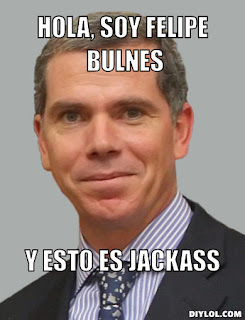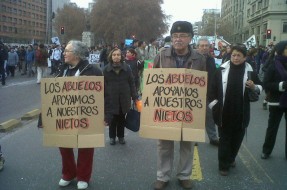Camila Vallejo
"The broader issue in this struggle is that like so much of the system in Chile, it favors the wealthy. The richest 20% of households earn half the national income and the bottom 20% earn just 5% of the national income. The government insists that the economic growth of the country will have a trickle down effect and all will feel the benefits but it seems the rich are staying rich and the poor, poor."
"Chile is a profoundly unequal country. The opportunities people have depend on what positions their parents have in society. The student movement seeks to level the playing field and expand opportunities."
- Patricio Navia, Chilean Political Scientist at NYU.
On January 4th the Chilean Senate took a vote on a bill that would end for-profit educational institutions from receiving state funding. The bill came as a direct result of the lengthy and ongoing student protests and won approval by a vote of 22-12. The bill still has a number of hurdles to overcome in the legislative process but it is a notable concrete step in the right direction to bringing change to education in Chile.
Unfortunately for the students, but fortunately for me, as this post never materialized in a timely manner, not too much earth shattering changes have come about yet due to the protests. However, the wheels are in motion.
In addition to the bill which is expected to be hotly contested and brought in front of a Constitutional Committee due to questions of constituionality, the government has agreed to an increase of 7.2% for education spending in 2012. Not the sweeping dramatic changes that the students have hoped to instill, but the message and mission remains strong and there seem to be chinks in the armour of the educational establishment that has served as the norm since the Pinochet Dictatorship. Heads within the government are still rolling, a sign that the pressure is building to institute change.
Joaquin Lavin, served as the Minister of Education for a little over a year before resigning in July due to pressures from the protests.
"I'm Cheating you"
Lavin attended the University of Chicago where he got a masters in economics. He also wrote a book "Una Revolucion Silenciosa" "A Quiet Revolution" in support of the Dictator Augusto Pinochet's policies. Clearly he wasn't going to jive with the students.
Felipe Bulnes, lasted from July to December as Minister of Education.
"Finland is the country with the highest rated educational system and it is 99% state funded. In Chile, this would be a great step backwards"- Felipe Bulnes. (Not an actual quote, but a satirical portrayal of the students' view of Bulnes' policies.)
Bulnes has a Masters from Harvard.
And public enemy number one and still standing, billionare businessman, President Pinera.
He also got a Masters from Harvard in Economics. A little strange how the ruling elite, the good old boys, all seem to study at the most prestigious universities in the United States . . . But there is no problem with the educational system in the country.
Harald Beyer is the newest Minister of Education, he was appointed on December 29th.
Oh and Beyer also studied in the U.S., he got a Doctorate in Economics from UCLA.
Many see Beyer as an expert in education with little political experience, which can be both a positive and negative. He has served as a consultant on educational matters for President Pinera and the previous president, as well as, working on the educational committee for a think tank, which personally does not install a lot of confidence in me because Joe and I used to call our room "the think tank" when we watched youtube videos under the knife mobile instead of doing homework, I hope theirs was different than ours (except for the knife mobile, all think tanks should have a knife mobile). The students see him as potentially being the right man for the job with important educational expertise but are afraid he may be easily handled by experienced politicians and not be able to institute the desired changes.
In light of the Occupy Protests in the U.S. I think it is important to compare and contrast it with the student movement in Chile. The most evident similarity is the fact that they both appeal to almost all demographics and all people. However, I see two important differences. The first, taking into consideration an observation of Patricio Navia, a Chilean political scientist who has voiced the fear that the student movement is going to lose momentum:
"It will be remembered as being ideologically pure, but not very effective. Looking for the revolution, it will lose the ability to influence gradual concrete change in the right direction."
I believe that in Chile, thus far, they have avoided this. The clear cut goal of the student protests is still to make quality and free education available to all Chileans. Keeping that in mind and driving toward that tangible goal is what has enabled a dialogue with the government and actual change to be possible.
In contrast, this is exactly how the Occupy Movement has come to be remembered. Occupy came to deal largely in the abstract, instead of keeping with a tangible goal, like that of the original Occupy Wall Street which was to bring Wall Street under greater public scrutiny and bring those who acted criminally, to justice. I personally could have seen a lot of good in channeling the protests to create funding to establish an independent watch dog group to keep an eye on the Wall Street establishment, but that is difficult to do without coordinated action. In the end the movement became a hodgepodge of causes across the U.S. and the camps came to be perceived as cauldrons of discontents and whiners who were envious of those who have more than them.
I think this video speaks for itself and is conveniently topical.
Somebody write this kid a check! (I knew he was in trouble when the one source he cited for his facts was the internet.)
The second observation, which I think is strongly connected to why the Occupy movement fizzled out was the refusal to define a leader. Clearly, one of the strongest aspects of the student movement in Chile is the strong and dynamic leadership. This leadership has been able to create a two day national strike and has opened a dialogue with regular meetings between students and the government. The movement has a voice and actions can be directed and coordinated.
Closing Notes:
- According to a nationwide standardized test administered to seniors, the test results between public and private schools has increased each year since 2004. The max score is 850 and in 2004 the average gap between public and private school kids was 118 points and as of last year private school kids were outscoring their public school counterparts by an average of 157 points.
- This is the biggest movement in Chile since the end of the Dictatorship and people do not have the same fear of the government that existed before. "We don't have the fear our parents did because we never lived in the dictatorship," - Student leader Camila Vallejo.
- Older generations that previously held their tongues because of the memories of the cruely of the dictatorship are also being inspired by the students and finding their voice.
Camila and used tear gas canister peace sign
She is now the vicepresident behind Gabriel Boric, a 23 year old law student. Boric is not politically affiliated like Camila Vallejo was to the Communist Party and seeks to keep the arenas separate with the focus staying on education.
- The movement is slowing down for the summer break, the Universidad de Chile is not being occupied by the students for the first time in more than 6 months. However, around 70 schools/universities will remain occupied.
This is where things stand today with the student movement, it will be interested to see where the movement goes with the new Minister of Education and the new president of the University of Chile student federation. The movement seems to be at a fragile point where momentum can be lost and it will fizzle out, like the Occupy protests but I have a feeling that the passion of the students, the decades of building discontent, and the progress that has already been made will keep things moving forward.
For those interested, I've put together a playlist on youtube with videos that cover all aspects of the movement. Different scenes from the protest, violence between protesters and the police, the interruption of government meetings by students, the President of Chile being asked about the movement during a visit to Harvard and an interview with Camila Vallejo, and if you are very ambitious a 30 minute documentary on the movement that is subtitled in English (you have to press the CC button), I've only watched the beginning which opens with a massive dance to Thriller in front of the Presidential Palace, La Moneda.
http://www.youtube.com/playlist?list=PL76AE10B8E116984D
For now, I leave you with this:










